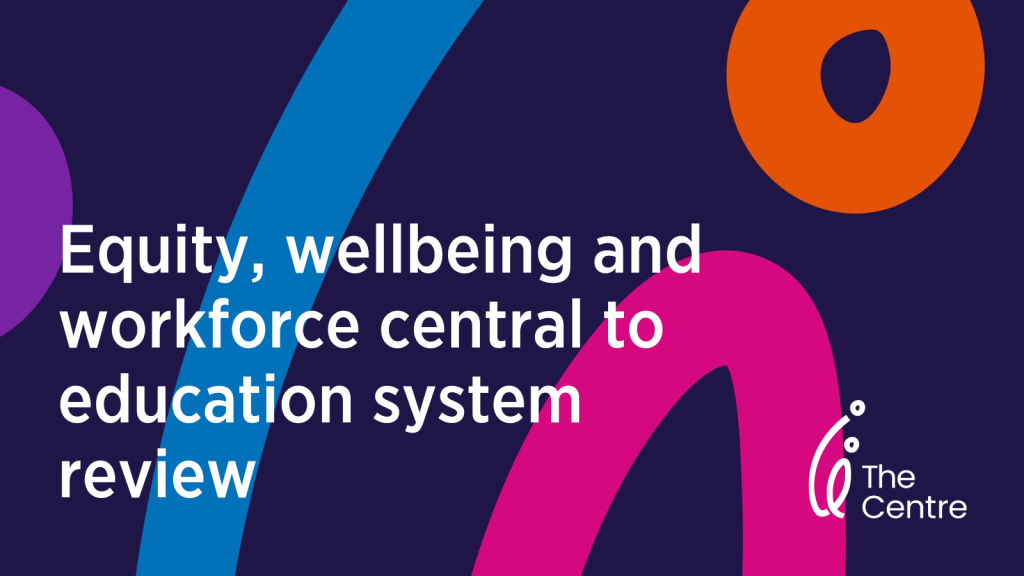The Centre welcomes the findings released this week of the expert panel review established to identify the reforms needed to drive real and measurable improvements for all students, particularly those most at risk of falling behind.
Improving Outcomes for All: The report of the Independent Expert Panel’s review to inform a better and fairer education system, builds on the Productivity Commission review of the National School Reform Agreement released in January 2023 and has been based on extensive consultation.
The report is intended to inform the development in 2024 of the next education funding and reform agreement between the Commonwealth and State and Territory Education ministers.
The 2019 Alice Springs (Mparntwe) Education Declaration (Mparntwe) is at the heart of this report. Mparntwe set out the following vision for Australian education:
Our vision is for a world class education system that encourages and supports every student to be the very best they can be, no matter where they live or what kind of learning challenges they may face.
To deliver the Mparntwe vision, the report identifies seven reform areas to focus on:
- Lift student outcomes.
- Improve equity.
- Improve student wellbeing.
- Attract and retain teachers.
- Reduce data gaps and limitations.
- enhance transparency and accountability.
- Support innovation and achieve reform.
The report is organised around these reform areas.
Key findings include:
Lift student outcomes
While there are pleasing trends in Australia’s international performance as measured by PISA between 2018 and 2022, there are still systemic challenges and areas where we need to improve, including in the performance of students from priority equity groups compared with their peers. The Centre welcomes the focus on early intervention to identify and address student needs, provision of targeted and intensive support to enable students to catch up, specific actions to support successful transition from school to post-secondary pathways, and use of evidence-based teaching methods, professional development and curriculum content.
Priority equity groups need to be given greater support
These groups include students with disability, First Nations students, those from low socio-economic backgrounds and care-experienced students. In keeping with what the Centre has long argued, the report finds that students in out-of-home care would benefit from being included as a priority equity group. Additionally, the report recognises the importance of creating better linkages between schools and external services, families and communities to support student attendance, engagement and outcomes. This is also something the Centre strongly supports, as we do the commitment to inclusive education being embedded across the school system to support the needs of students with disability.
Improve student wellbeing
This is another strong focus of the Centre’s advocacy – improving the mental health and wellbeing of all children and young people. We welcome the proposal to incorporate the development of a national wellbeing measure in the next Schools Agreement, which could focus on such indicators as a sense of belonging, safety, cultural safety, engagement and classroom disruption. We also support the call for investment in specialist staff, professional development and evidence-informed resources to enable staff to meet the wellbeing needs of all students better.
Attract and retain teachers
The report recognises that while teaching is the most influential in-school factor in improving student outcomes, teachers do now work alone. Highly effective teaching also benefits from a positive whole-of-school learning culture; high-quality professional development, mentoring and coaching; relevant and evidence-informed resources; supportive relationships with parents and communities; and realistic workloads that can support retention. The Centre also supports the use of other incentives to attract first-rate teachers through such means as competitive starting salaries, enhanced career pathways, and better employment conditions.
Reduce gaps and limitations
The report highlights the significant data gaps that exist in relation to priority equity groups, particularly for students with disability. The Centre has long argued for better state and national data collection to track what happens to students across their school journey, including more consistent definitions of students in priority groups for data collection purposes. We welcome the proposal to task an existing independent body with responsibility for data governance and sharing. Such a data custodian role would enable nationwide coordination and better use of existing and new data to inform policy and funding decisions and hold systems accountable.
Enhance funding transparency and accountability
It is clear from the report that Australia’s education systems lack transparency and accountability in relation to current funding arrangements. There is little visibility of how public funding is allocated and expended. The Centre supports the call for the publication of nationally consistent, detailed and up-to-date information on school funding models, annual funding allocations to schools and needs-based funding. This includes greater transparency around how schools are meeting their obligations in relation to students with disability.
Support innovation and achieve reform
The report suggests a ten-year operational cycle for the next Agreement to help reduce the impact on the workforce of ‘relentless change and instability’ and to allow sufficient time for the reforms proposed in the report to take effect. The Centre supports the proposal for governments to use the next Agreement to set out their theory of change and facilitate monitoring, reporting and knowledge-sharing to support the successful implementation of the reforms.
The report outlines a set of targets, with a strong focus on equity and disaggregation of data by priority cohorts and proposes a structured approach to funding trials and evaluations of innovative models in education. The Centre strongly supports the recommendation to develop the next Agreement in partnership with First Nations education representatives, including Aboriginal national and peak bodies.
The Expert Panel has outlined an ambitious reform agenda which, if implemented, would lead to a fairer, more equitable education system with the holistic development of all students at its heart.
View the review resources here.






